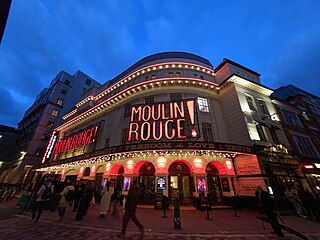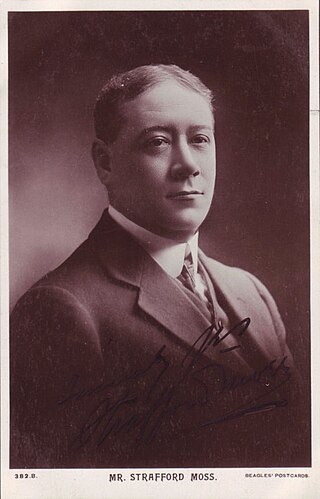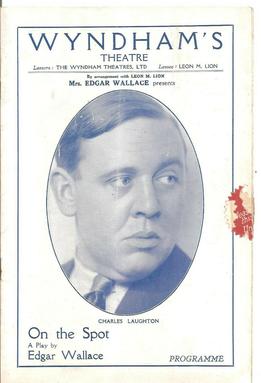Related Research Articles

Dame Mary Louise Webster,, known professionally as May Whitty and later, for her charity work, Dame May Whitty, was an English stage and film actress. She was one of the first two women entertainers to become a Dame. The British actors' union Equity was established in her home in 1930.

Una O'Connor was an Irish-born American actress who worked extensively in theatre before becoming a character actress in film and in television. She often portrayed comical wives, housekeepers and servants. In 2020, she was listed at number 19 on The Irish Times list of Ireland's greatest film actors.

Sir Francis Robert Benson was an English actor-manager. He founded his own company in 1883 and produced all but two of Shakespeare's plays. His thirty-year association with the Shakespeare Memorial Theatre and the annual Shakespeare Festival in Stratford-upon-Avon laid down foundations for the creation of the Royal Shakespeare Company after his death.

The Piccadilly Theatre is a West End theatre located at the junction of Denman Street and Sherwood Street, near Piccadilly Circus, in the City of Westminster, London. It opened in 1928.
The Westminster Theatre was a theatre in London, on Palace Street in Westminster.

Frederick Strafford Moss was a British tenor and actor. He appeared in the Savoy operas of Gilbert and Sullivan from 1897 to 1913, mainly in touring companies of the D'Oyly Carte Opera Company, following which he had a career in musical theatre on the West End stage until 1931.
Saloon Bar is a 1939 British crime drama play written by Frank Harvey. It ran for a hundred and eighty performances at Wyndham's Theatre in London. The original cast included Gordon Harker, Mervyn Johns and Anna Konstam. It marked Margaret Johnston's West End debut. The regulars at a London pub attempt to prove that a man is about to be wrongly hanged for murder.

On the Spot is a 1930 Chicago-set play by the British writer Edgar Wallace. Wallace was inspired by a visit to the United States and, in particular, the Saint Valentine's Day Massacre. Known as a prolific author, he reportedly dictated the manuscript for the play in just four days. It was his greatest theatrical success.
The Calendar is a 1929 play by the British writer Edgar Wallace. It is a crime thriller set in the world of horse racing world, the sport being among Wallace's interests. The protagonist is a financially struggling racehorse owner with a shady reputation. It premiered at the Palace Theatre in Manchester before transferring to Wyndham's Theatre in the West End.
The Mouthpiece is a 1930 crime play by the British writer Edgar Wallace. It was one of several theatrical failures written by Wallace following the enormous success of On the Spot, with a plot described as "flimsy".
The Old Man is a 1931 mystery play by the British writer Edgar Wallace. Its original production was staged at Wyndham's Theatre in London's West End for a ninety performance run. It is set entirely in the "Coat of Arms" tavern where a mysterious old man lurks in the background, reputedly an escapee from a lunatic asylum. The original cast included Alfred Drayton, Jack Melford, Harold Warrender and Finlay Currie.
Smoky Cell is a thriller play by the British writer Edgar Wallace first staged in 1930. In America a group of detectives hunt down a notorious racketeer.
The Outsider is a play by the British writer Dorothy Brandon. It portrays the struggle of an unorthodox medical practitioner to gain acceptance by the medical establishment. It was subsequently revised to show the unconventional triumphing over the conventional, whereas the play had originally had the opposite ending.
The Good Companions is a 1931 play by J.B. Priestley and Edward Knoblock, based on Priestley's 1929 novel of the same title about a touring concert party. The music was composed by Richard Addinsell.

Little Ladyship is a 1939 comedy play by the British writer Ian Hay.
Bees on the Boat Deck is a 1936 comedy drama play by the British writer J.B. Priestley.

Mr Faint-Heart is a 1931 comedy play by the British writer Ian Hay. It was staged at the Shaftesbury Theatre in London's West End between 20 April and 20 June 1931.

Mr. Whittington is a British musical with a book by Clifford Grey, Greatrex Newman and Douglas Furber and music by Johnny Green, Jack Waller and Joseph Tunbridge with additional lyrics provided by Edward Heyman. It was based on the traditional story of Dick Whittington, designed as a vehicle for the entertainer Jack Buchanan.

Poison Pen is a mystery play by the British writer Richard Llewellyn. In a small English village, a series of Poison pen letters cause chaos and suspicion.

Lean Harvest is a 1931 play by the British writer Ronald Jeans. It portrays a married couple in the years after the First World War, with the New Statesman review concluding that the moral of the play was "too much money and too little money are equally dangerous to married happiness".